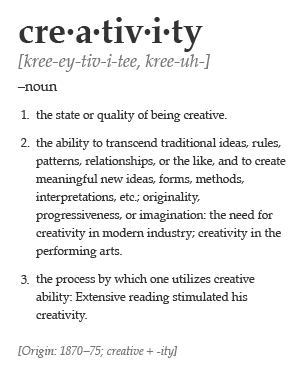Did you know there are nearly 500 definitions of the word creativity? Frankly, that’s probably a low estimate.
Most people who visit this website are probably focusing on business creativity, which is great.
BUT – just in case – let’s be specific because creativity is often two things with a smudgy border.
There’s aesthetic creativity. This is the creativity of artists (writers, musicians, designers) whose output reflects their perspective, emotion, situation, personality or point-of-view.
Next, there’s creative problem solving, which is (arguably) creativity for the rest of us. As the name suggests, this kind of creativity is focused on two aspects:
- Understanding the problem to be solved, and
- Generating potential solutions to ‘solve’ the problem
That said, not every problem can be solved. But, if you’re going to try, you’ll need a solution … aka, an .
That’s where creativity becomes very handy.
Is it 'Business Creativity'?
More often than not – and perhaps I shouldn’t do this – but I generally think of creative problem solving as business creativity.
As someone who’s taught both business and creativity since 2001, there are some universal truths in all my workshops. Here are two of the most important:
You need to know exactly what your problem is that’s preventing the organisation from achieving its goal, and
You need to create ideas which solve the problem so the business can achieve its goal.
Remember too that ideas generally solve the problem in three completely different ways. Are you trying to …
Eliminate the problem? That is, get rid of it altogether? Oof – that’s oftentimes a very complex task. How much resources (time, money for starters) do you have?
Minimise the problem? Ok, that’s fine, but aren’t you really just postponing the inevitable?
Contextualise the problem? You’re going to put the problem in context with someone else, usually larger than the immediate situation. Politicians try to do this all the time, and what do we usually think of politicians who do this?
Most important: Which one are you trying to do?
Or, if you aren’t certain, isn’t it possible your solution may doing the wrong thing?
Yes, that was a tangent … but an important tangent to know so you can improve the effectiveness of what your organisation is trying to accomplish. Anywoo.
Here are some common 'everyday' definitions of creativity
With that background in mind, here are some of the most common and unusual definitions of creativity, admittedly most are tilted toward creative problem solving.
- The birth of imaginative new ideas
- Looking at the same thing as everyone else, but seeing it differently
- Bringing something new into the world
- Creativity comes from a world we don’t know we don’t know
- The ability to discover new relationship and combinations
- The imaginatively gifted recombination of known elements into something new
- Effective surprise
- To take a bet against the unknown
- The habit of continually doing things in new ways to make a positive difference to our working lives
- Making connections between ideas where none previously existed
- The ability to discover new relationship and combinations
Of all the definitions of creativity, I prefer this one.
Creativity is the act of combining previously unconnected ideas, concepts, information or elements to make something new, unique or useful.
Do you have a preferred definition of creativity? Please add yours to the Comments section below.
♥
Since I originally post this article in 2010 …
Boy oh boy, did I hear from people.
In fact, I had so many people respond that I’ve added the best comments here. (Didn’t I say my original estimate was probably low?)
So, here are a few more definitions of creativity, including citations when I can identify them.
The ability to create.
Having or showing imagination and artistic or intellectual inventiveness.
I’m not 100%, but I believe the authors are Drs. Richard Paul and Linda Elder, from The Foundation of Critical Thinking.
Nothing more than going beyond the current boundaries, whether those are boundaries of technology, knowledge, current practices, social norms, or beliefs. Creativity is nothing more than seeing and acting on new relationships, thereby bringing them to life.
Joseph V. Anderson, from “Weirder than fiction: the reality and myths of creativity”, Academy of Management Executive, 6:4 (1992), page 41.
Generating new ideas and concepts, or making connections between ideas where none previously existed.
Mitchell Rigie and Keith Harmeyer, SmartStorming
Creativity is a type of learning process where the teacher and pupil are located in the same individual.
Arthur Koestler, the journalist and novelist
Creativity is the ability to find new solutions to a problem or new modes of expression; thus it brings into existence something new to the individual and to the culture.
Drawing on the Right Side of the Brain by Dr. Betty Edwards
I define creativity as the act of turning new and imaginative ideas into reality. Creativity involves two processes: thinking, then producing. Innovation is the production or implementation of an idea. If you have ideas, but don’t act on them, you are imaginative but not creative.
Linda Naiman, author of the blog Creativity At Work
Creativity is the process of bringing something new into being. Creativity requires passion and commitment. It brings to our awareness what was previously hidden and points to new life. The experience is one of heightened consciousness: ecstasy.
The Courage to Create by Rollo May
Please join in! What is your favourite definition of creativity? Add your comments and thoughts below.



1 Comment
Creativity begins with changing what is already into existence to something new or unique. This involves changing what is known to something new. It is the ability to bring something into the world by making a positive difference to something into existence.